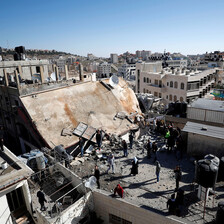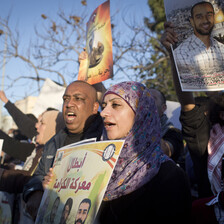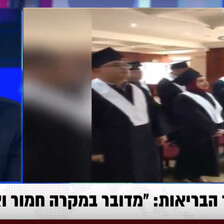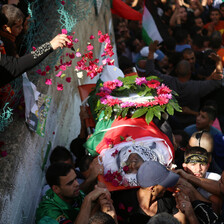The Electronic Intifada Jerusalem 8 April 2017
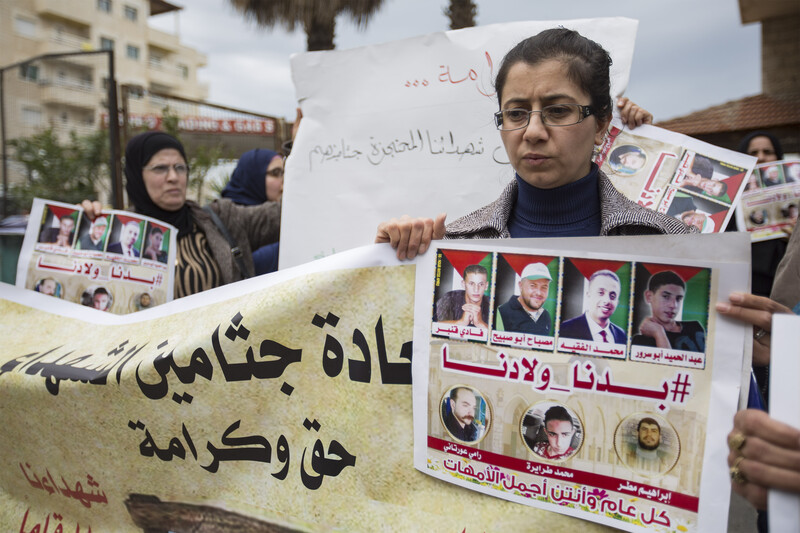
The relatives of slain Palestinians whose bodies are withheld by Israel call for the transfer of their loved ones’ remains at a protest in front of an Israeli checkpoint in Bethlehem on 22 March.
ActiveStillsMother’s Day has taken on a new dimension for Ibtisam al-Aghwani.
On it, she feels a “great sense of responsibility” towards her son Louay. “He always gave me flowers and a big hug on that day,” she said. “Now I want to have the chance to put flowers on his grave.”
Ibtisam does not know precisely what happened to her son.
In February 2008, it was reported that Louay and another Palestinian fighter had carried out a suicide bombing in Dimona, a city in present-day Israel.
Israeli forces shot dead one of the fighters, reportedly after his explosives belt had failed to detonate. One Israeli citizen was killed in the bombing.
Doubts were quickly cast on whether Louay was involved in that incident. On the following day, Hamas claimed responsibility for the bombing.
The men who carried out the bombing were, according to Hamas, from Hebron in the occupied West Bank.
Louay, on the other hand, had grown up in Gaza City. He was not affiliated to Hamas but to its rival Fatah and that party’s armed wing, the al-Aqsa Martyrs Brigades.
“I didn’t know whether to believe the news or not,” his mother, Ibtisam, said by telephone. “But I told his father that as long as we don’t see his body or his place of burial, I won’t believe that he has died.”
Some press reports indicated that Louay had crossed from Gaza into Egypt and been arrested there.
Ibtisam traveled to Egypt, contacting everyone that might be able to help her. For four years, she searched for any information that could lead to her son’s whereabouts.
Eventually, an official at the International Committee of the Red Cross told her in 2012 that Louay was buried in one of Israel’s “cemeteries of numbers.”
These are anonymous graveyards – designated as closed military zones – where Israel buries people it describes as “enemy combatants.” The people are identified only by numbers etched on metal plates.
It is impossible to know the precise number of bodies buried in these cemeteries. According to the Jerusalem Legal Aid and Human Rights Center, there are at least 268 Palestinians in those cemeteries. That figure does not include 19 Palestinians who were killed during the 2014 attack on Gaza and whose bodies have not yet been returned to their families.
The Israeli military has stated that there are 123 Palestinians buried in those cemeteries. The statement was made at a hearing of the Israeli high court in March this year.
The hearing followed a lawsuit taken by the Jerusalem Legal Aid and Human Rights Center on behalf of the families of more than 100 Palestinian fighters. The families are demanding that Israel disclose the burial places of the fighters, identify them through DNA testing and return their bodies for proper burial.
In March, the high court ordered that a process must begin within three months, whereby the Israeli military sets about identifying all the bodies of those buried in these cemeteries.
“Died in my arms”
Mufid Naalwa from Tulkarm in the West Bank has been searching for his brother, Kamal, for almost 34 years.
“Thirty-four years is a very long time,” said Mufid. “But we wouldn’t forget him in 100 years. I always tell my children about him, that he was brave and fought for justice and freedom, so that his memory will live on among them when I die.”
Kamal was in his mid-twenties when he became a fighter with the Palestine Liberation Organization. During the 1980s, he resisted Israel’s invasion of Lebanon.
In August 1983, Kamal was killed by the Israeli military in the small Lebanese town of al-Mukhtara.
“He died in my arms,” said his friend and comrade Hamid Ali Barho.
Barho had been in jail before his comrade was killed. He was arrested again after the killing and held at Ansar, a detention center in southern Lebanon.
Three months later, he was among 5,000 prisoners released as part of an exchange deal. The prisoners were released in return for the PLO handing over six Israeli soldiers that it had captured.
Barho learned through the Red Cross that Kamal – whom he had known by the nom de guerre Abu Ali – had been buried in a “cemetery of numbers.”
Both men had made a pledge. If one was killed, the other would inform the dead man’s family about what had happened.
Barho now lives in the West Bank city of Ramallah. He was allowed to move back to Palestine following the Oslo accords in the 1990s.
He did not have contact details for Kamal’s family at the time of his return to Palestine. “Finding the family was extremely difficult,” Barho said. “But giving up was not an option.”
Kamal’s parents were already dead by the time Barho had succeeded in making contact with the family. Kamal’s whereabouts remained a mystery to his parents when they died.
Bargaining chip?
As well as burying Palestinians in unnamed graves, Israel has held many bodies in morgues for long periods.
After a Palestinian uprising began in October 2015, Israel delayed handing over the corpses of those killed by its troops. Around 140 corpses were kept in morgues, as a result.
The vast majority were eventually released to their families. Yet Israel still retains the corpses of eight Palestinians, four of whom are from Jerusalem.
The eight bodies are those of Abd al-Hamid Abu Srour, Muhammad al-Faqih, Muhammad Tarayra, Rami Awartani, Misbah Abu Sbeih, Fadi Qunbar, Ibrahim Matar and Siham al-Nimir.
In January this year, the Israeli government decided to transfer the bodies held in morgues to the “cemeteries of numbers.”
It was suggested that the bodies could be used as a bargaining chip in negotiations aimed at securing the return of Israeli soldiers or their corpses supposedly held by Hamas in Gaza.
Israel’s high court issued an injunction against such a move in March, however. The court ordered the Israeli military to provide a justification within 45 days for its decision to retain Palestinian corpses.
“We never count on Israeli courts to give us justice,” said Azhar Abu Srour, who is waiting for Israel to hand over the body of her son Abd al-Hamid. “But I was obviously relieved that they did not transfer my son’s body to the cemeteries of numbers. The fact that Israel is allowed to imprison our sons even after their deaths is a crime in and of itself.”
Abd al-Hamid Abu Srour, a resident of Aida refugee camp in Bethlehem, died in April 2016, reportedly from wounds sustained while carrying out an attack on a bus in Jerusalem.
Azhar is campaigning for the release of all Palestinian bodies to their families. She is planning to continue campaigning even after her own son’s body is returned.
“I cannot begin to imagine how the families whose sons’ bodies have been held in the cemeteries of numbers for decades feel,” she said. “But it is our duty – as mothers of martyrs and as Palestinians – to fight for our right to bury our sons in their land and among their loved ones.”
Budour Youssef Hassan is a Palestinian writer and law graduate based in occupied Jerusalem. Blog: budourhassan.wordpress.com
Tags
- Cemetery of Numbers
- Ibtisam al-Aghwani
- Louay al-Aghwani
- Jerusalem Legal Aid and Human Rights Center
- Mufid Naalwa
- Kamal Naalwa
- Hamid Ali Barho
- Abd al-Hamid Abu Srour
- Muhammad al-Faqih
- Muhammad Nasir Mahmoud Khalil al-Tarayra
- Rami Awartani
- Misbah Abu Sbeih
- Fadi Ahmad Hamdan al-Qunbar
- Ibrahim Matar
- Siham al-Nimir
- Azhar Abu Srour
